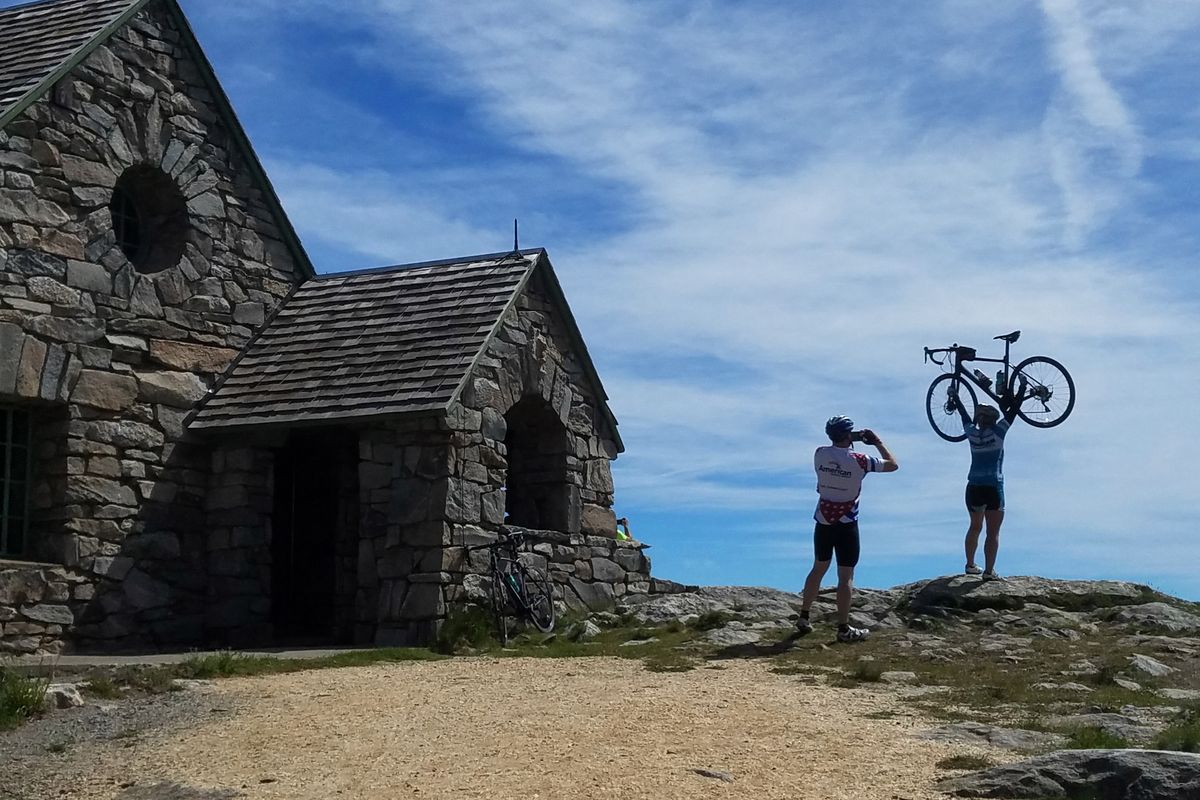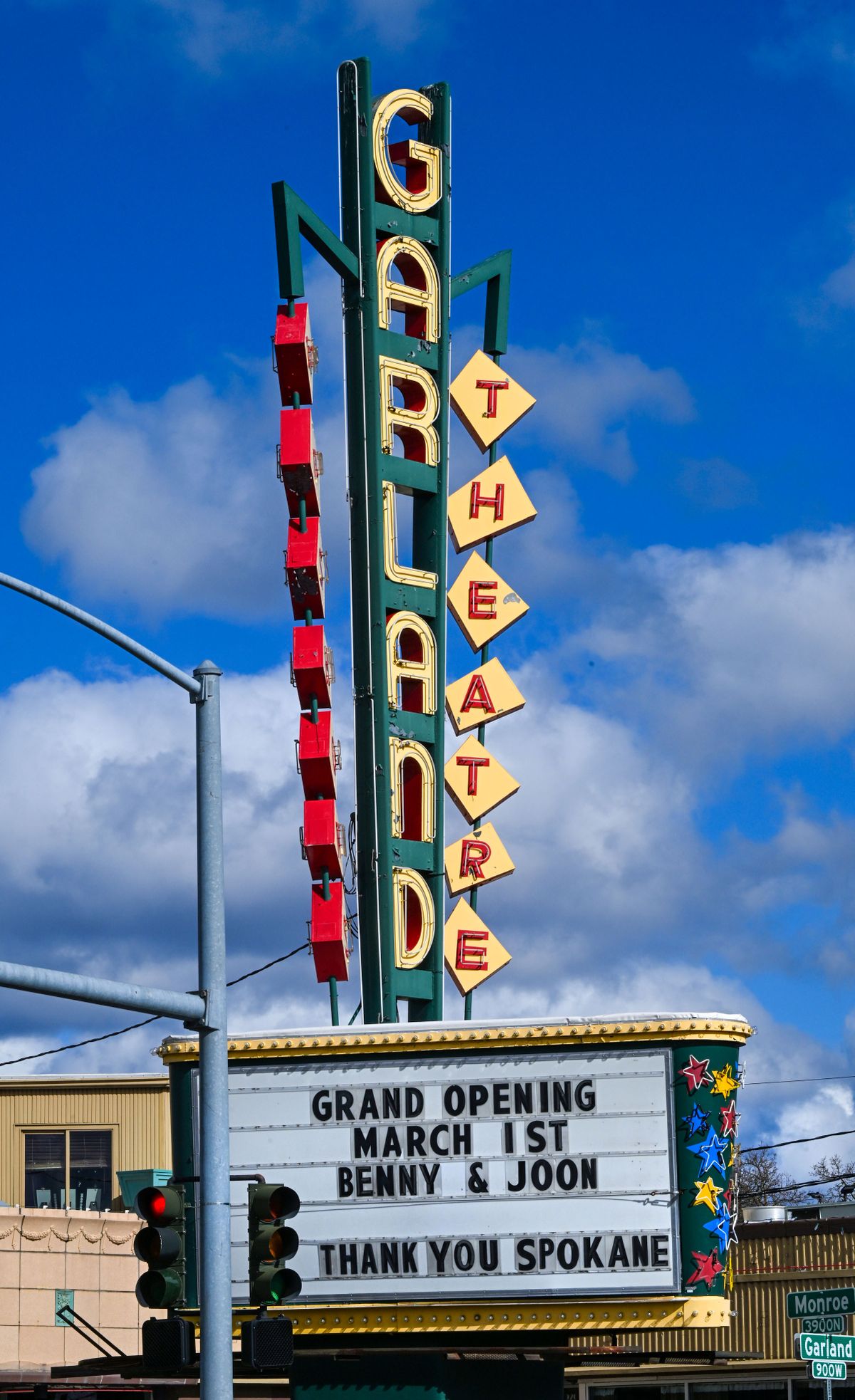What’s so great about Spokane, anyway? Transplants share their favorite things about Spokane.
Cyclists celebrate riding the Summit Road to the Vista House near the top of Mount Spokane. In addition to pedaling, visitors can reach the 5,883-foot summit through the year by foot, horseback, snowshoe, ski, chairlift, snowmobile or other motor vehicle. (Spokesman-Review photo archives)
When Lucas McIntyre moved to Spokane from Memphis, Tennessee, in 1998, he had never seen a mountain. At least, not one bigger than his apartment building.
“Where I grew up, we had muddy water and swamps. The nearest thing to a mountain was 800 feet,” McIntyre said. “That was the tallest ‘mountain’ I ever saw until I came out West.”
The mountains weren’t what convinced McIntyre to relocate to Spokane. He met a girl on an Ani DiFranco AOL forum a year before and followed her to the Evergreen State to start a family.
The first mountain McIntyre “ever got close to” was Mount Spokane, he said. He drove up on an August day and took a look around, only for that experience to completely change his outlook on the outdoors.
“…Like nothing I had ever experienced before. Since that first trip I have snowshoed up there, hiked up there, camped up there, biked up there,” he said. “Hell, I tried to get married there.”
When his daughter grew up and moved to Olympia to attend college, he pondered moving away, since he felt he didn’t have any more ties to Spokane.
“But where would I go?” he asked.
Over the 25 years of living in Spokane, McIntyre has heard all the discourse about the city – some claims that it’s dangerous, gross or the ongoing conversation by city leaders about homelessness downtown. Sometimes it’s a similar rhetoric to what Sheldon Jackson, Spokane businessman and CEO of Selkirk Development, occasionally discusses in an email thread with other business leaders in talking about homelessness and public safety in Spokane.
“After being in Idaho for a few days, the contrast is disgusting,” Jackson wrote on Tuesday morning. “We must be idiots to live here.”
McIntyre doesn’t exactly get a warm fuzzy feeling driving past Second Avenue and Division Street, an area known for open drug use, but believes Spokane “has its problems” like any city – an abandonment of downtown, then the urban sprawl and revitalization of the area inevitably led to housing problems, he said.
While there is occasional trash on the street and people without shelter sleeping on the sidewalks, the most well-known term to describe Spokane is a term that locals often hear from out-of-towners: “Spokompton,” an affront to the city of Compton, California, for being associated with drugs and gang violence.
McInytre said he’s never been anywhere in Spokane where he felt in danger. While there are some lower-income areas that homeless people often frequent, he said, he still doesn’t have the same sentiment as others when it comes to safety.
“I assure you, after moving here, this is not a dangerous town,” he said.
In 2020, homicides increased over 200% from the year prior from the months of January to August – in the same period this year, homicides have steadily decreased over the last seven months, according to Spokane Police data. Also decreasing from January to August are crimes like rape, commercial robbery, personal robbery and assault.
A 2024 point-in-time report also detailed less people experiencing homelessness this year than the year prior. The report states there are 2,021 living on the streets and in shelters, down from 2,390 during the 2023 survey.
Still, the term “Spokompton” also appears in multiple online forums from out-of-towners questioning if Spokane is “actually as dangerous” as everyone says it is.
Six years ago, a commenter on Reddit wrote that half of their friends only know the city by the term “Spokompton” and consider the area to be more urban lower-class.
“I always defend Spokane and talk about how great it is (because Spokane really is awesome!),” the Redditor wrote, “but constantly being on the defense is getting old.”
Another commenter on a City Data forum back in 2019 wrote under a discussion about the term that people who use the term are “condescending idiots” who look down on Spokane because it’s a more blue-collar, working-class city, and has been for over 100 years; the city got its foot in the nation’s door through massive labor union strikes in the early 1900s, where loggers, miners and railroad workers would often hold demonstrations.
When a law was passed barring speeches on street corners, demonstrators took turns making speeches for their cause and getting arrested. Police threw around 500 people in jail in 1909, giving the city its fair share in publicity.
The history that lies with Spokane is something McIntyre loves – it’s noted in the architecture of the buildings, he said, and spreads through the central core of downtown, something impossible to escape.
“A lot of people don’t realize how important Spokane was for free speech and unions,” McIntrye said. “It’s really a fascinating town.”
Even the Park Inn, a local tavern on the South Hill that’s been around since 1932, looks almost identical to how it looked in the 1950s. It’s a testament to how the city has kept up with its history, he said – “glorious and unchanged.”
Ryan Schmall, who moved here with his three children from California three years ago, said the city has a different atmosphere than Palm Springs. He was impressed with the sense of community and how almost ordinary everything seemed. Spokane isn’t as fast-paced.
“It’s a totally different way to live life,” he said. “We aren’t a big city, but we are. You’re not completely abandoning the benefits from a city, and we also are not super big. There’s not this feeling we have to compete with everyone around us all time.”
Schmall enjoys going to the movies and taking a stroll. He will go so far as to park his car farther away from his destination just so he can walk downtown, he said. The Garland Theater is a place he encourages people to go if they’re looking for a good movie and piece of Spokane history.
“That place is awesome,” he said.
There’s a concerted effort to bring well-known musicians to the city, whether it be at the Knitting Factory or outdoors at the U.S. Pavilion while the rainbow lights flash with the music. When Schmall moved here, he thought he would have to travel to Seattle frequently to see his favorite artists, but was pleased to learn that wasn’t the case. And even if he can’t see a specific band in Spokane, the Gorge Amphitheatre is two hours away.
While walking downtown, Schmall is no stranger to seeing homeless people or the occasional police car. But to him, certain areas of California were “way more problematic.”
“With my exposure to a number of realities we face, I can see it. I’m there. My basic approach is that they are still human beings and we forget that,” he said. “We demonize a lot of the problems we face and forget the humanity behind it.”
Spokane just has more beauty than people are willing to explore, Schmall said.
The Centennial Trail spans almost 40 miles from Spokane to Coeur d’Alene, Idaho, a common place for local recreators to run, bike or just enjoy a walk. Part of the trail is outside McIntyre’s front door, an easy walk for him when he wants to get closer to nature.
That’s why the Inland Northwest is so great for activities, he said. “You can drive an hour in any direction from Spokane and end up in a completely different environment.”
While some outdoor activities lie 20 minutes to an hour away, Riverfront Park is a spot that “is talked about all the time,” said Elisabeth Hooker, the vice president of marketing and programming for the Downtown Spokane Partnership.
“But that’s because it’s a treasure,” as one of the largest urban waterfalls in the nation, she said.
“You can see a beautiful gorge in the heart of our city,” Hooker said. “I encourage people to grab a sandwich and just walk around.”
That’s exactly what she does – a native Spokane resident, Hooker will take a walk through the historic Davenport Hotel and adore a marriage proposal etched into the woodwork above one of the ballrooms. She’ll admire a sculpture by Harold Balazs near the First Interstate Center for the Arts in downtown Spokane, an art piece where the message, “transcend the bullshit” can only be seen if someone scales the concrete mass to see it.
Spokane has accomplished a lot over the years, Hooker said, and it makes her proud. One thing the city could work on is incentivizing housing downtown, which would bring in more amenities like grocery stores or exciting nightlife activities to get young people more engaged, she said.
Hooker said if people want to prove her love of Spokane wrong, that’s fine. But give it time, she said – “and I’ll prove myself right.”
“We as Spokanites often forget to be tourists in our own city,” she said. “You forget to notice the delightful things we do have.”
Something McIntyre noticed throughout his years of living in Spokane was a special quality he hadn’t seen elsewhere – the perseverance of the community and the nerve to push forward.
“It has its problems,” McIntyre said. “But going back to the founding of Spokane, we are a ‘shake it off and keep moving’ type of town. Our whole town burned down in 1889 and we shook it off and kept going.
“I was 23 when I moved here. It’s worth sticking it out.”






